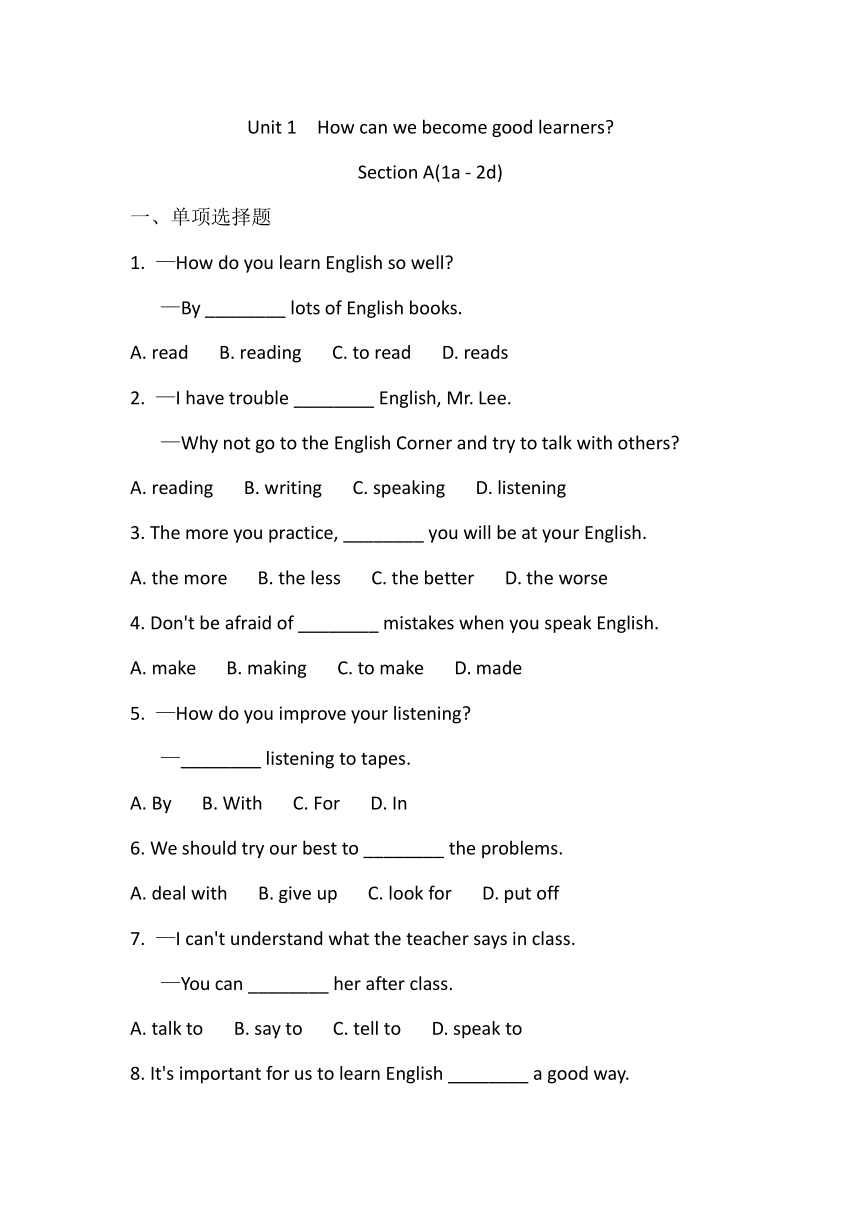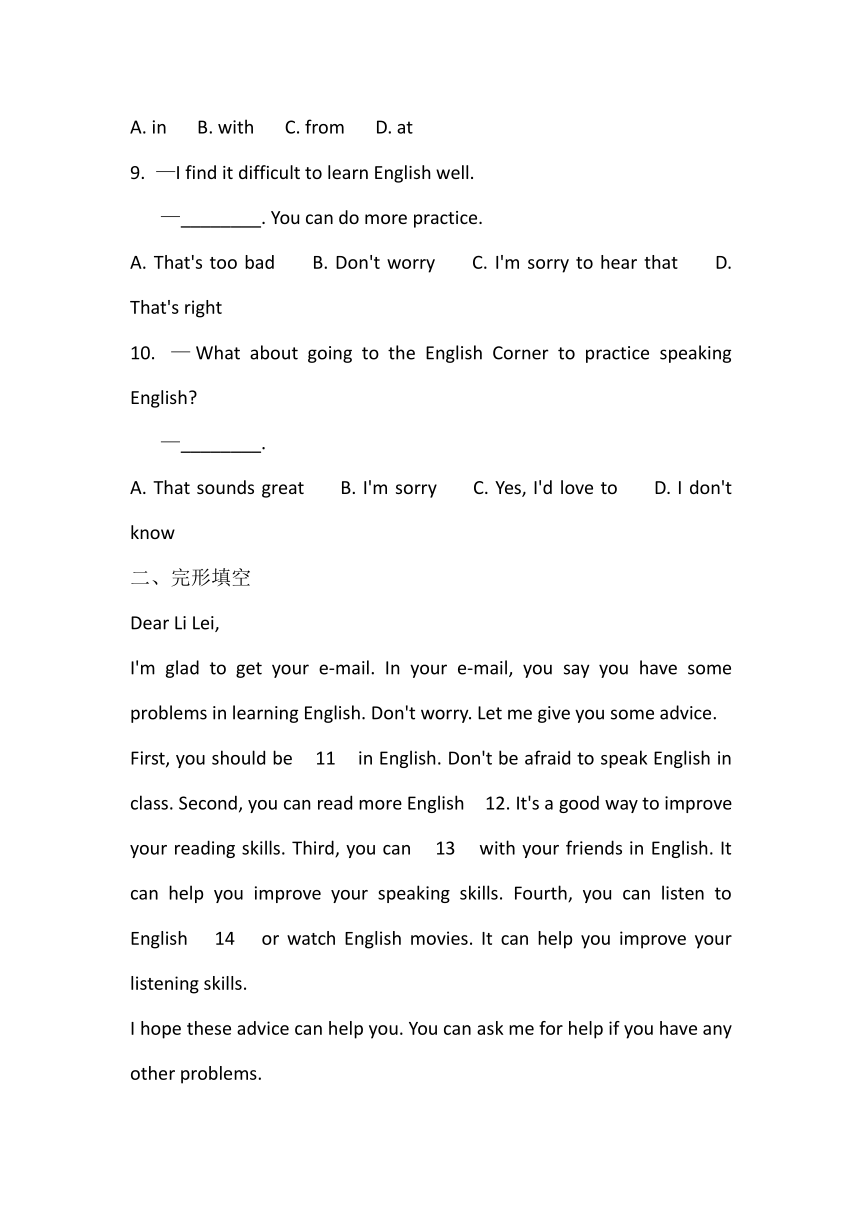Unit 1How can we become good learners Section A1a - 2d同步练习(无答案)人教版九年级全册
文档属性
| 名称 | Unit 1How can we become good learners Section A1a - 2d同步练习(无答案)人教版九年级全册 |

|
|
| 格式 | docx | ||
| 文件大小 | 17.9KB | ||
| 资源类型 | 教案 | ||
| 版本资源 | 人教新目标(Go for it)版 | ||
| 科目 | 英语 | ||
| 更新时间 | 2024-09-11 13:31:26 | ||
图片预览


文档简介
Unit 1 How can we become good learners
Section A(1a - 2d)
一、单项选择题
1. —How do you learn English so well
—By ________ lots of English books.
A. read B. reading C. to read D. reads
2. —I have trouble ________ English, Mr. Lee.
—Why not go to the English Corner and try to talk with others
A. reading B. writing C. speaking D. listening
3. The more you practice, ________ you will be at your English.
A. the more B. the less C. the better D. the worse
4. Don't be afraid of ________ mistakes when you speak English.
A. make B. making C. to make D. made
5. —How do you improve your listening
—________ listening to tapes.
A. By B. With C. For D. In
6. We should try our best to ________ the problems.
A. deal with B. give up C. look for D. put off
7. —I can't understand what the teacher says in class.
—You can ________ her after class.
A. talk to B. say to C. tell to D. speak to
8. It's important for us to learn English ________ a good way.
A. in B. with C. from D. at
9. —I find it difficult to learn English well.
—________. You can do more practice.
A. That's too bad B. Don't worry C. I'm sorry to hear that D. That's right
10. —What about going to the English Corner to practice speaking English
—________.
A. That sounds great B. I'm sorry C. Yes, I'd love to D. I don't know
二、完形填空
Dear Li Lei,
I'm glad to get your e-mail. In your e-mail, you say you have some problems in learning English. Don't worry. Let me give you some advice.
First, you should be 11 in English. Don't be afraid to speak English in class. Second, you can read more English 12. It's a good way to improve your reading skills. Third, you can 13 with your friends in English. It can help you improve your speaking skills. Fourth, you can listen to English 14 or watch English movies. It can help you improve your listening skills.
I hope these advice can help you. You can ask me for help if you have any other problems.
Yours,
Meimei
11. A. interested B. confident C. strict D. afraid
12. A. books B. movies C. songs D. news
13. A. talk B. play C. study D. sing
14. A. tapes B. programs C. radios D. stories
三、阅读理解
Many students want to improve their memories and learn better. Here are some ways to help you.
First, when you study, you should focus on the book. Don't think about other things. If you do this, you can learn better.
Second, you should try to understand what you are learning. It's very important. If you don't understand it, you can ask your teacher or your classmates for help.
Third, you should review what you have learned regularly. This can help you remember what you have learned.
Fourth, you can do some exercises to help you learn better. For example, you can do some reading exercises or writing exercises.
Finally, you should have a good rest. If you are tired, you can't learn well.
I hope these ways can help you. Good luck!
15. How many ways are there to help you improve your memories and learn better
A. Three. B. Four. C. Five. D. Six.
16. What should you do when you study
A. Think about other things. B. Focus on the book.
C. Listen to music. D. Talk with your classmates.
17. Why should you try to understand what you are learning
A. Because it's very interesting.
B. Because it's very easy.
C. Because it's very important.
D. Because it's very boring.
18. What can you do to help you learn better
A. Do some exercises. B. Watch TV.
C. Play computer games. D. Sleep all day.
四、补全对话
A: Hello, Li Ming! I heard you got an A in the English test. Congratulations!
B: Thank you!
A: I know you are good at English. 19. ________
B: I learn English by reading English books and newspapers.
A: 20. ________
B: Yes, I do. I often go to the English Corner.
A: How often do you go there
B: 21. ________
A: Do you think it's helpful
B: Yes, it is. 22. ________
A: I want to improve my English, too. Can I go with you next time
B: Of course. 23. ________
A: Thank you very much.
B: You're welcome.
Section A(1a - 2d)
一、单项选择题
1. —How do you learn English so well
—By ________ lots of English books.
A. read B. reading C. to read D. reads
2. —I have trouble ________ English, Mr. Lee.
—Why not go to the English Corner and try to talk with others
A. reading B. writing C. speaking D. listening
3. The more you practice, ________ you will be at your English.
A. the more B. the less C. the better D. the worse
4. Don't be afraid of ________ mistakes when you speak English.
A. make B. making C. to make D. made
5. —How do you improve your listening
—________ listening to tapes.
A. By B. With C. For D. In
6. We should try our best to ________ the problems.
A. deal with B. give up C. look for D. put off
7. —I can't understand what the teacher says in class.
—You can ________ her after class.
A. talk to B. say to C. tell to D. speak to
8. It's important for us to learn English ________ a good way.
A. in B. with C. from D. at
9. —I find it difficult to learn English well.
—________. You can do more practice.
A. That's too bad B. Don't worry C. I'm sorry to hear that D. That's right
10. —What about going to the English Corner to practice speaking English
—________.
A. That sounds great B. I'm sorry C. Yes, I'd love to D. I don't know
二、完形填空
Dear Li Lei,
I'm glad to get your e-mail. In your e-mail, you say you have some problems in learning English. Don't worry. Let me give you some advice.
First, you should be 11 in English. Don't be afraid to speak English in class. Second, you can read more English 12. It's a good way to improve your reading skills. Third, you can 13 with your friends in English. It can help you improve your speaking skills. Fourth, you can listen to English 14 or watch English movies. It can help you improve your listening skills.
I hope these advice can help you. You can ask me for help if you have any other problems.
Yours,
Meimei
11. A. interested B. confident C. strict D. afraid
12. A. books B. movies C. songs D. news
13. A. talk B. play C. study D. sing
14. A. tapes B. programs C. radios D. stories
三、阅读理解
Many students want to improve their memories and learn better. Here are some ways to help you.
First, when you study, you should focus on the book. Don't think about other things. If you do this, you can learn better.
Second, you should try to understand what you are learning. It's very important. If you don't understand it, you can ask your teacher or your classmates for help.
Third, you should review what you have learned regularly. This can help you remember what you have learned.
Fourth, you can do some exercises to help you learn better. For example, you can do some reading exercises or writing exercises.
Finally, you should have a good rest. If you are tired, you can't learn well.
I hope these ways can help you. Good luck!
15. How many ways are there to help you improve your memories and learn better
A. Three. B. Four. C. Five. D. Six.
16. What should you do when you study
A. Think about other things. B. Focus on the book.
C. Listen to music. D. Talk with your classmates.
17. Why should you try to understand what you are learning
A. Because it's very interesting.
B. Because it's very easy.
C. Because it's very important.
D. Because it's very boring.
18. What can you do to help you learn better
A. Do some exercises. B. Watch TV.
C. Play computer games. D. Sleep all day.
四、补全对话
A: Hello, Li Ming! I heard you got an A in the English test. Congratulations!
B: Thank you!
A: I know you are good at English. 19. ________
B: I learn English by reading English books and newspapers.
A: 20. ________
B: Yes, I do. I often go to the English Corner.
A: How often do you go there
B: 21. ________
A: Do you think it's helpful
B: Yes, it is. 22. ________
A: I want to improve my English, too. Can I go with you next time
B: Of course. 23. ________
A: Thank you very much.
B: You're welcome.
同课章节目录
- Unit 1 How can we become good learners.
- Section A
- Section B
- Unit 2 I think that mooncakes are delicious!
- Section A
- Section B
- Unit 3 Could you please tell me where the restroom
- Section A
- Section B
- Unit 4 I used to be afraid of the dark.
- Section A
- Section B
- Unit 5 What are the shirts made of?
- Section A
- Section B
- Review of Units 1-5
- Unit 6 When was it invented?
- Section A
- Section B
- Unit 7 Teenagers should be allowed to choose their
- Section A
- Section B
- Unit 8 It must belong to Carla.
- Section A
- Section B
- Unit 9 I like music that I can dance to.
- Section A
- Section B
- Unit 10 You're supposed to shake hands.
- Section A
- Section B
- Review of Units 6-10
- Unit 11 Sad movies make me cry.
- Section A
- Section B
- Unit 12 Life is full of the unexpected
- Section A
- Section B
- Unit 13 We're trying to save the earth!
- Section A
- Section B
- Unit 14 I remember meeting all of you in Grade 7.
- Section A
- Section B
- Review of Units 11-14
